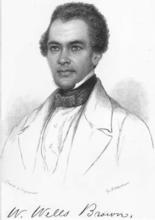Description
William was born into slavery in 1814 in Lexington, Kentucky, as his mother Elizabeth was a slave. He was a prominent African-American abolitionist lecturer, novelist, playwright, and historian. Born into slavery in Lexington, Kentucky, Brown escaped to the North in 1834, where he worked for abolitionist causes and was a prolific writer. From 1836 to about 1845, Brown made his home in Buffalo, New York, where he worked as a steamboat man on Lake Erie. He helped many fugitive slaves gain their freedom by hiding them on the boat to take them to Buffalo, or Detroit, Michigan or across the lake to Canada. He later wrote that from May to December 1842, seven months, he had helped 69 fugitives reach Canada. Brown became active in the abolitionist movement in Buffalo by joining several anti-slavery societies and the Negro Convention Movement. In 1849, Brown left the United States with his two young daughters to travel in the British Isles to lecture against slavery. He wanted them to gain the education he had been denied. He was also selected as a representative of the US that year at the International Peace Congress in Paris. After his return to the US, Brown gave lectures for the abolitionist movement in New York and Massachusetts. He soon focused on anti-slavery efforts. His speeches expressed his belief in the power of moral suasion and the importance of nonviolence. He often attacked the supposed American ideal of democracy and the use of religion to promote submissiveness among slaves.
Source
Notable Facts
- Wrote "Clotel", a novel considered to be the first written by an African American

